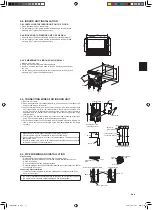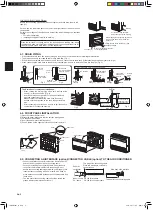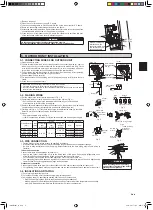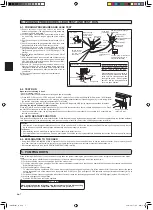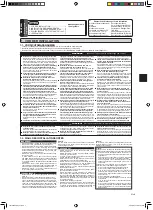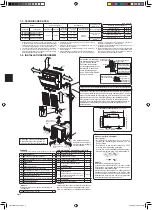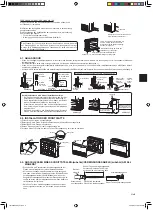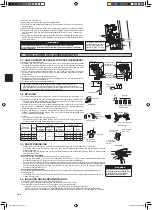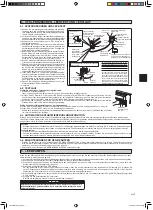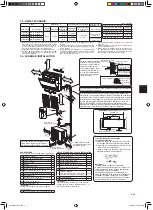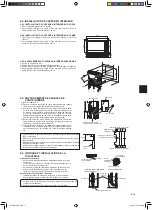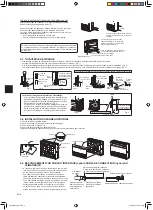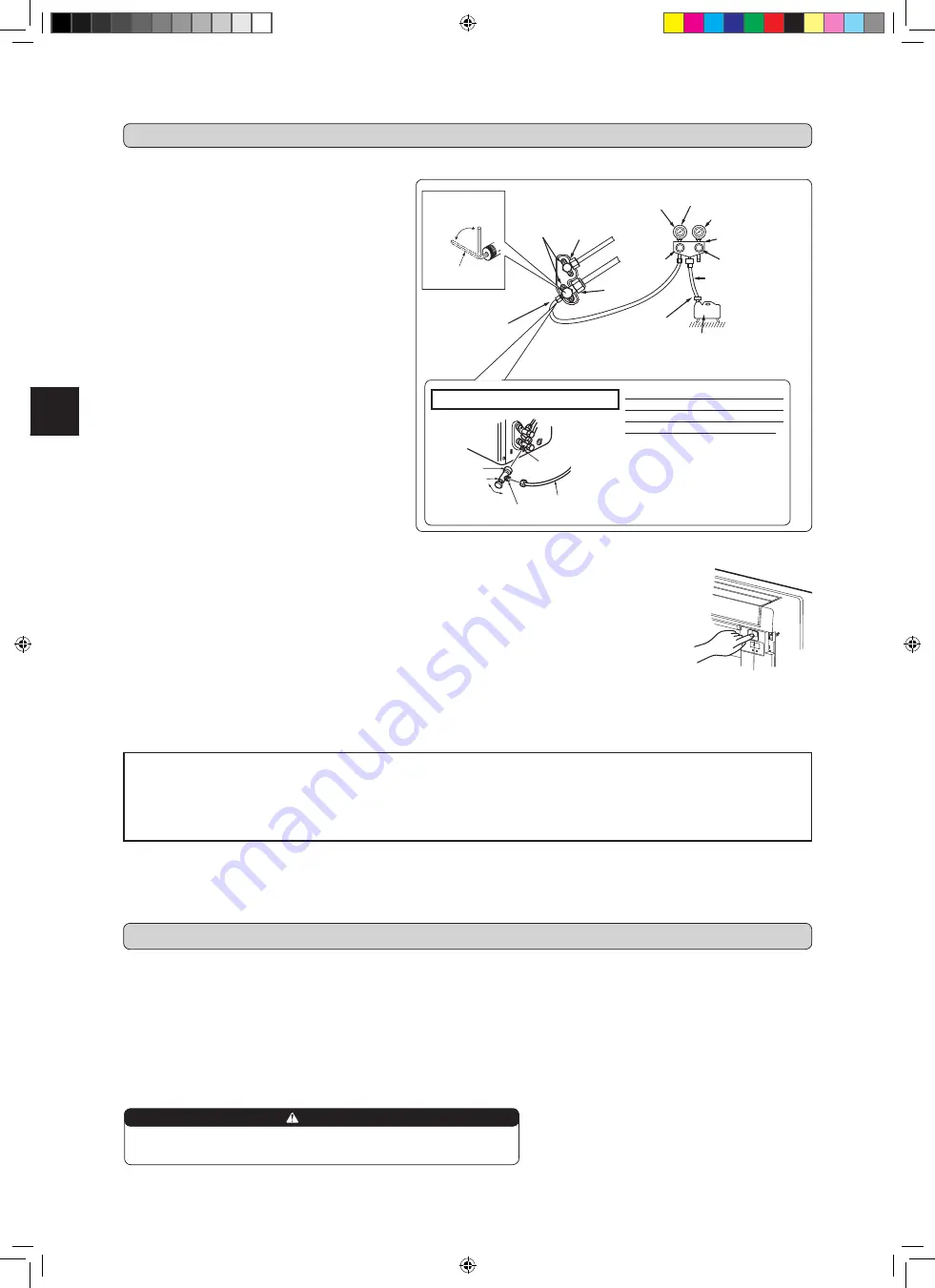
En-
When relocating or disposing of the air conditioner, pump down the system following the procedure below so that no refrigerant is released into the atmos
-
phere.
1) Connect the gauge manifold valve to the service port of the stop valve on the gas pipe side of the outdoor unit.
2) Fully close the stop valve on the liquid pipe side of the outdoor unit.
3) Close the stop valve on the gas pipe side of the outdoor unit almost completely so that it can be easily closed fully when the pressure gauge shows 0
MPa [Gauge] (0 kgf/cm
2
).
4) Start the emergency COOL operation.
To start the
emergency operation in COOL mode, disconnect the power supply plug and/or turn off the breaker. After 15 seconds, connect the power
supply plug and/or turn on the breaker, and then press the E.O. SW once. (The emergency COOL operation can be performed continuously for up to
30 minutes.)
5) Fully close the stop valve on the gas pipe side of the outdoor unit when the pressure gauge shows 0.05 to 0 MPa [Gauge] (approx. 0.5 to 0 kgf/cm
2
).
6) Stop the emergency COOL operation
.
Press the E.O. SW twice to stop the operation.
5. PuMPING DoWN
4-4. EXPLANATION TO THE USER
• Using the OPERATING INSTRUCTIONS, explain to the user how to use the air conditioner (how to use the remote controller, how to remove the air fil
-
ters, how to remove or put the remote controller in the remote controller holder, how to clean, precautions for operation, etc.)
• Recommend the user to read the OPERATING INSTRUCTIONS carefully.
Caution:
• After test run or remote signal reception check, turn off the unit with the E.O. SW or the remote controller before turning off the power supply. Not do
-
ing so will cause the unit to start operation automatically when power supply is resumed.
To the user
• After installing the unit, make sure to explain the user about auto restart function.
• If auto restart function is unnecessary, it can be deactivated. Consult the service representative to deactivate the function. Refer to the service manual
for details.
4-3. AUTO RESTART FUNCTION
This product is equipped with an auto restart function. When the power supply is stopped during operation, such as during blackouts, the function automati
-
cally starts operation in the previous setting once the power supply is resumed. (Refer to the operating instructions for details.)
4-2. TEST RUN
Make sure the following is done.
• Panel is installed correctly.
• Indoor and outdoor units are installed correctly, and power is supplied.
1) Press the E.O. SW once for
COOL, and twice for HEAT operation. Test run will be performed for 30 minutes. If the left lamp
of the operation indicator blinks every 0.5 seconds, inspect the indoor/outdoor unit connecting wire (A) for mis-wiring. After
the test run, emergency mode (set temperature 24ºC) will start.
2) To stop operation, press the E.O. SW several times until all LED lamps turn off. Refer to operating instructions for details.
Checking the remote (infrared) signal reception
Press the ON/OFF button on the remote controller (12) and check that an electronic sound is heard from the indoor unit. Press
the ON/OFF button again to turn the air conditioner off.
• Once the compressor stops, the restart preventive device operates so the compressor will not operate for 3 minutes to pro-
tect the air conditioner.
4. PURGING PROCEDURES, LEAK TEST, AND TEST RUN
Emergency operation
switch (E.O. SW)
When pumping down the refrigerant, stop the compressor before disconnecting
the refrigerant pipes. The compressor may burst if air etc. get into it.
WARNING
4-1. PURGING PROCEDURES AND LEAK TEST
Stop valve for
GAS
Stop valve cap
(Torque 19.6 to
29.4 N•m, 200
to 300 kgf•cm)
Vacuum pump (or the vacuum
pump with the function to
prevent the back flow)
Gauge manifold valve
(for R410A)
Compound pressure gauge
(for R410A)
–
0.101 MPa
(
–
760 mmHg)
Handle
Low
Handle High
Adapter for pre-
venting the back
flow
Charge hose
(for R410A)
*Close
*Open
Hexagonal wrench
Precautions when using the control valve When attaching the control valve to
the service port, valve core may de
-
form or loosen if excess pressure is
applied. This may cause gas leak.
Service port
Body
Close
Open
Control valve
A
When attaching the control valve to
the service port, make sure that the
valve core is in closed position, and
then tighten part A. Do not tighten
part A or turn the body when valve
core is in open position.
Service port cap
(Torque 13.7 to
17.7 N•m, 140 to
180 kgf
•cm
)
*4 to 5 turns
1) Remove service port cap of stop valve on the side of the
outdoor unit gas pipe. (The stop valves are fully closed and
covered in caps in initial state.)
2) Connect gauge manifold valve and vacuum pump to serv
-
ice port of stop valve on the gas pipe side of the outdoor
unit.
3) Run the vacuum pump. (Vacuumize for more than 15 min
-
utes.)
4) Check the vacuum with gauge manifold valve, then close
gauge manifold valve, and stop the vacuum pump.
5) Leave as it is for one or two minutes. Make sure pointer
gauge manifold valve remains in the same position. Confirm
that pressure gauge shows –0.101 MPa [Gauge] (–760
mmHg).
6) Remove gauge manifold valve quickly from service port of
stop valve.
7) After refrigerant pipes are connected and evacuated, fully
open all stop valves on both sides of gas pipe and liquid
pipe. Operating without fully opening lowers the perform
-
ance and this causes trouble.
8) Refer to 1-3., and charge the prescribed amount of re
-
frigerant if needed. Be sure to charge slowly with liquid
refrigerant. Otherwise, composition of the refrigerant in the
system may be changed and affect performance of the air
conditioner.
9) Tighten cap of service port to obtain the initial status.
10) Leak test
Stop valve
for LIQUID
Pressure gauge
(for R410A)
Charge hose
JG79A762H01_en.indd 7
2013/04/17 (水) 午後 2:45:01





